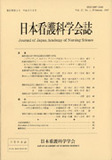Japanese
English
- 販売していません
- Abstract 文献概要
- 参考文献 Reference
- サイト内被引用 Cited by
要旨
夜間介護を行うための睡眠中断が介護者の睡眠に及ぼす影響を調べる目的で,45歳の女性を被験者として,試行2夜に続き,病院の個室で夜間介護をした3夜と介護をしなかった自宅での1夜の連続4夜,および2週間後に自宅で2夜,計6夜の睡眠ポリグラフィを実施し,以下の結果を得た.
1)非介護3夜の睡眠時間のレンジは356~367分と安定していたのに比べ,介護した3夜は日による差が大きく,271~391分であった.
2)介護のための睡眠中断は,強制覚醒によるものではなかったが,3夜とも睡眠周期のリズムに乱れが認められた.
3)介護第1夜と第2夜は睡眠率が低く,各睡眠段階率が類似していたが,介護第3夜は前の2夜よりもむしろ介護をしなかった夜の睡眠に近かった.
4)入眠潜時は介護第1夜から非介護第1夜にかけて日毎に短縮し,介護第3夜と非介護第1夜は,被験者の通常の睡眠である非介護第2夜,第3夜と比べても短かった.これらは,夜間介護による疲労の蓄積の影響の大きさを示唆するものである.
Abstract
In order to investigate the effects of night wakening on sleep pattern of caregiver, a woman aged 45 years was studied using electroencephalogram (EEG). After two adaptation nights, her allnight EEG readings were recorded for six nights. During the first three consecutive nights, the subject slept by the side of a patient at a private ward of hospital and wakened by herself several times a night to provide care for the patient (care nights). Of the later three nights, her sleep EEGs were recorded at her home (free nights). The first free night was following three care nights and the other two free nights were after 2 weeks. The results were summarized as follows ;
1) Sleep period time (SPT) of care nights differed in different nights. In contrast to the SPT range of 356-367 min during free nights, it was 271-391 min during the care nights.
2) The rhythm of sleep cycles of care nights was not stable, though the subject wakened by herself, not using an alarm clock.
3) Although there were few changes occurring in sleep efficiency (SE) and percent each stage for SPT (%SPT) between the first and second care night, SE of the third care night was more similar to SE of free nights than SE of the first two care nights, and so was %SPT of the third care night.
4) Sleep latency (SL) decreased during the four consecutive nights, i.e. the three care nights and the first free night, and SL of the third care night and the first free night were shorter than SL of the last two free nights. The accumulation of fatigue and stress of nighttime care was suggested.
Copyright © 1997, Japan Academy of Nursing Science. All rights reserved.


